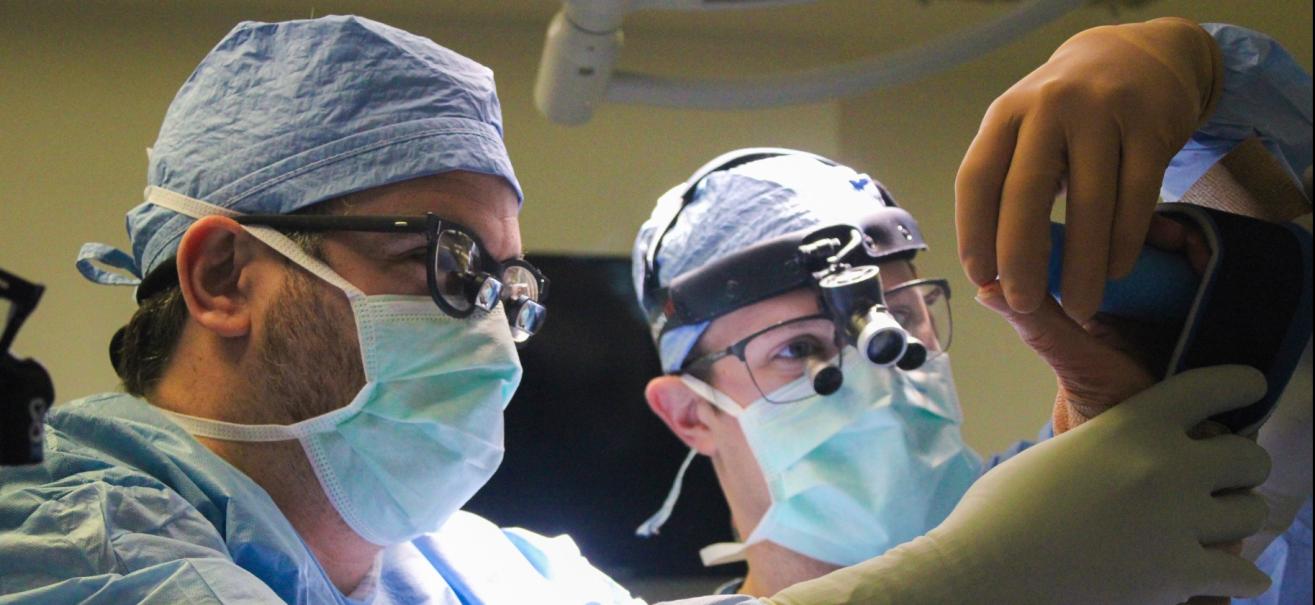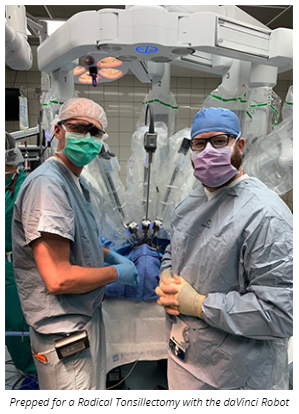Hearing Challenges? Here's When to Seek Help from a Hearing ENT
Wiki Article
Exploring the Area of Otolaryngology: What to Anticipate When You Consult an ENT
Otolaryngology, frequently referred to as ENT, encompasses the medical diagnosis and therapy of throat, nose, and ear disorders. For those experiencing related problems, getting in touch with an ENT professional can supply clearness and alleviation. Comprehending what to anticipate during such examinations is crucial for effective communication and care. This introduction will describe key elements of the ENT experience, including common factors for brows through and the processes involved in medical diagnosis and therapy.
Understanding Otolaryngology: An Introduction
Otolaryngology, commonly described as ENT (Ear, throat, and nose) medicine, is a customized branch of medication that concentrates on the medical diagnosis and treatment of conditions affecting these essential locations of the body. This area encompasses a wide variety of problems, consisting of those relevant to hearing, balance, respiratory function, and speech. Otolaryngologists are trained to take care of both surgical and medical treatments, utilizing advanced techniques and technologies. Their competence prolongs past standard disorders, resolving concerns such as allergic reactions, sinus infections, and hearing loss. Furthermore, they play an important duty in the monitoring of head and neck cancers cells, supplying complete care customized to private client requirements. In general, otolaryngology remains important for maintaining wellness and lifestyle in afflicted individuals.Common Factors to See an ENT Specialist
Many individuals look for the knowledge of an ENT professional for a selection of reasons, showing the varied nature of conditions that impact the ear, throat, and nose. Usual issues include chronic sinus problems, which often causes relentless nasal congestion and facial pain. Allergies and their linked signs and symptoms, such as itching and sneezing, additionally motivate visits to these experts (Otolaryngology). Hearing loss, whether abrupt or gradual, is another considerable reason for examination. Additionally, people might look for examination for throat problems, including consistent hoarseness or ingesting problems. Sleep apnea, defined by disturbed breathing during rest, is regularly addressed by ENT specialists as well. Each of these conditions highlights the significance of specialized care in managing complex ENT-related health concerns
Planning for Your ENT Visit
When getting ready for an ENT visit, it is vital to gather relevant details and take into consideration any type of particular issues. Patients need to assemble an in-depth case history, consisting of previous ear, nose, or throat problems, surgical treatments, and current drugs. Recording symptoms-- such as intensity, duration, and regularity-- can provide beneficial insights for the ENT professional. Furthermore, people must prepare a list of inquiries they wish to ask, making certain that all problems are resolved during the visit. Bringing along any type of relevant medical documents or test outcomes can further help the ENT in understanding the individual's problem. People should verify their consultation details, including time, day, and area, to minimize any last-minute complication. Correct prep work can enhance the effectiveness of the examination and bring about better outcomes.What to Expect During the Examination
As the consultation starts, the patient can anticipate to participate in a complete conversation with the ENT specialist about their symptoms and case history. The specialist will ask about the duration, frequency, and severity of symptoms such as hearing loss, nasal congestion, or sore throat. Additionally, the patient's previous clinical problems, drugs, and any kind of pertinent family members background will be examined, helping the expert in forming a complete understanding of the patient's health. The ENT might additionally inquire about way of life elements, such as exposure to irritants or toxic irritants. This open discussion develops a foundation for the examination, guaranteeing that the client's concerns are dealt with and setting the phase for any necessary assessments or recommendations for treatment.
Diagnostic Examinations and Procedures in Otolaryngology
A series of diagnostic tests and treatments are crucial in otolaryngology to precisely assess and detect problems influencing the throat, nose, and ear. Usual tests include audiometry, which gauges hearing function, and tympanometry, analyzing center ear pressure. Nasal endoscopy allows visualization of the nasal passages and sinuses, while laryngoscopy checks out the throat and singing cords. Imaging strategies, such as CT scans and MRIs, supply comprehensive sights of head and neck structures. Allergic reaction testing might additionally be carried out to recognize triggers for sinus or breathing problems. These diagnostic devices enable ENT experts to develop an extensive understanding of individuals' conditions, ensuring customized and efficient monitoring plans. Appropriate medical diagnosis is crucial for successful therapy results in otolaryngology.Therapy Alternatives Offered by ENT Specialists
ENT specialists use a variety of treatment choices customized to deal with specific problems impacting the throat, nose, and ear. These therapies range from conventional strategies, such as medication and lifestyle adjustments, to even more intrusive treatments. For example, allergies may be handled with antihistamines or immunotherapy, while chronic sinus problems could call for nasal corticosteroids or sinus surgery. For hearing loss, ENT professionals usually recommend hearing aids or surgical interventions like cochlear implants. In cases of throat disorders, options can consist of speech treatment or procedures to get rid of blockages. Furthermore, they may offer assistance for handling sleep apnea, including making use of CPAP tools or medical treatments. Generally, the goal is to improve clients' quality of life via individualized treatment and efficient therapy techniques.When to Seek Follow-Up Treatment With an ENT
When to look for follow-up care with an ENT professional is crucial for handling ongoing signs and symptoms or issues associated to nose, throat, and ear conditions, recognizing. Individuals ought to consider arranging a follow-up appointment if signs and symptoms persist regardless of preliminary therapy, such as chronic ear discomfort, nasal congestion, or throat pain. Changes in hearing, equilibrium issues, or uncommon nasal discharge might also call for further analysis. Additionally, if a person experiences side impacts from suggested medicines or has actually gone through a procedure, follow-up treatment is very important to check recovery and attend to any kind of issues. Prompt consultations can ensure reliable management of conditions, protect against potential problems, and supply satisfaction pertaining to one's wellness. Looking for follow-up care promotes positive wellness monitoring in otolaryngology.Frequently Asked Concerns

What Certifications Should I Search for in an ENT Specialist?
When looking for an ENT expert, one must search for board certification, pertinent experience, and strong client testimonials. Furthermore, efficient interaction abilities and a compassionate strategy can considerably enhance the overall therapy experience.Exactly how Do I Choose the Right ENT for My Demands?
Selecting the best ENT specialist involves reviewing their certifications, experience, and patient testimonials (Otolaryngology). It is essential to ponder their communication design and approach to treatment, guaranteeing they line up with the person's particular wellness demands and preferencesExist Any Kind Of Threats Connected With ENT Procedures?
The risks connected with ENT treatments might include infection, bleeding, anesthetic problems, and potential damages to surrounding structures. People ought to talk about these dangers with their medical professional to understand private concerns and assurance educated choices.How Can I Handle Anxiety Before My ENT Visit?
To take care of stress and anxiety prior to a consultation, individuals can exercise deep breathing workouts, imagine favorable end results, prepare inquiries in advance, and look for assistance from buddies or household, Voice cultivating a feeling of reassurance and calmness.What Should I Do if I Experience Side Effects From Treatment?
The person needs to without delay report them to their medical care provider if side effects from treatment occur. Adjustments to therapy or extra treatments may be required to ensure security and effectiveness in managing their problem - ENT Doctor. As the examination starts, the individual can expect to engage in a comprehensive discussion with the ENT specialist concerning their signs and symptoms and clinical history. These diagnostic devices enable ENT specialists to establish an extensive understanding of clients' conditions, ensuring tailored and efficient administration plans. ENT specialists supply a range of therapy choices tailored to address details conditions affecting the ear, nose, and throat. When looking for an ENT expert, one should look for board qualification, appropriate experience, and strong individual evaluations. Picking the ideal ENT specialist entails assessing their qualifications, experience, and individual reviewsReport this wiki page